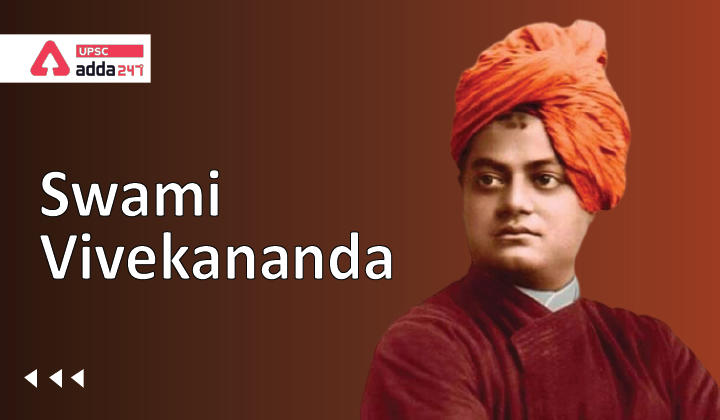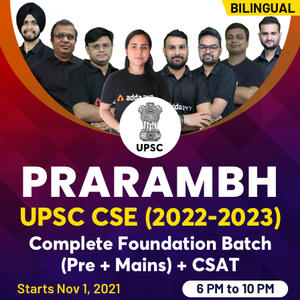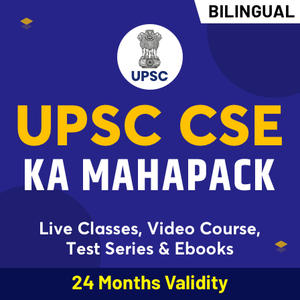Table of Contents
Swami Vivekananda- Relevance for UPSC Exam
- GS Paper 1: Indian History- Modern Indian history from about the middle of the eighteenth century until the present- significant events, personalities, issues.
Swami Vivekananda- Context
- Recently, the Prime Minister has paid tributes to Swami Vivekananda on his Jayanti. On this occasion, he also inaugurated the 25th National Youth Festival in Puducherry, via video conferencing.
- In India, the birth anniversary of Swami Vivekananda is observed as National Youth Day since 1984.
- Netaji Subhas Chandra Bose had called Swami Vivekananda the “maker of modern India.”
Swami Vivekananda- Key Points
- Birth: Swami Vivekananda was born on 12th January 1863 in a Bengali family in Calcutta, West Bengal.
- Swami Vivekananda was originally named Narendranath Datta.
- In 1893, he took the name ‘Vivekananda’, upon the request of Maharaja Ajit Singh of the Khetri State.
- The Government of India in 1984 declared his birthday National Youth Day.
- Early Life and Education:
- From a young age, Swami Vivekananda nurtured a keen interest in Western philosophy, history, religion, spirituality and theology.
- Swami Vivekananda came into contact with his Guru Ramakrishna Paramhansa and remained devoted to him until the latter’s death in 1886.
- In 1886, Swami Vivekananda formally accepted monastic vows.
- Death: Swami Vivekananda attained Mahasamadhi on 4th July 1902 in Belur Math, located in West Bengal.
Swami Vivekananda- Key Contributions
- Philosophy of Yoga and Vedanta: Swami Vivekananda is credited with introducing Indian philosophies of Vedanta and Yoga to the Western world.
- Swami Vivekananda represented India in the first Parliament of Religion held in Chicago (U.S.) in 1893.
- Preached Philosophy of ‘Neo-Vedanta’: Swami Vivekananda preached ‘neo-Vedanta’, which is an interpretation of Hinduism through a Western lens and believed in combining spirituality with material progress.
- Philosophy of Neo-Vedanta is a modern interpretation of Vedanta, with a liberal attitude toward the Vedas.
- Philosophy of Neo-Vedanta reconciles dualism and non-dualism and rejects the “universal illusionism” of Shankaracharya.
- Literary Works: Swami Vivekananda gave four pathways of attaining moksha from the worldly pleasure and attachment through his books –
- Raja Yoga
- Jnana Yoga
- Karma Yoga
- Bhakti Yoga
- Associated Organizations:
- Ramakrishna Mission: Swami Vivekananda established the Ramakrishna Mission in 1897.
- Through Ramakrishna Mission, Swami Vivekanand aimed to bring the noblest ideas to the doorstep of even the poorest and the meanest.
- Ramakrishna Mission works in the area of value-based education, culture, health, women’s empowerment, youth and tribal welfare and relief and rehabilitation.
- Belur Math: It was established by Swami Vivekanand in West Bengal in 1899 which became his permanent abode. He died here in 1902.
- Ramakrishna Mission: Swami Vivekananda established the Ramakrishna Mission in 1897.
- Focus on Education: Swami Vivekananda emphasized educating the young of India for the regeneration of our motherland.
- Swami Vivekananda believed in imparting man-making character-building education.
- Swami Vivekanand toured across India with an aim to educate the masses about ways to improve their economic condition along with imparting spiritual knowledge.
- Swami Vivekananda believed that a nation is advanced in proportion as education is spread among the masses.
- He also zealously worked for educating the women and the lower castes people.
National Youth Festival 2022- PM to Inaugurate 25th National Youth Festival
National Youth Festival 2022- PM to Inaugurate 25th National Youth Festival






 TSPSC Group 1 Question Paper 2024, Downl...
TSPSC Group 1 Question Paper 2024, Downl...
 TSPSC Group 1 Answer key 2024 Out, Downl...
TSPSC Group 1 Answer key 2024 Out, Downl...
 UPSC Prelims 2024 Question Paper, Downlo...
UPSC Prelims 2024 Question Paper, Downlo...




